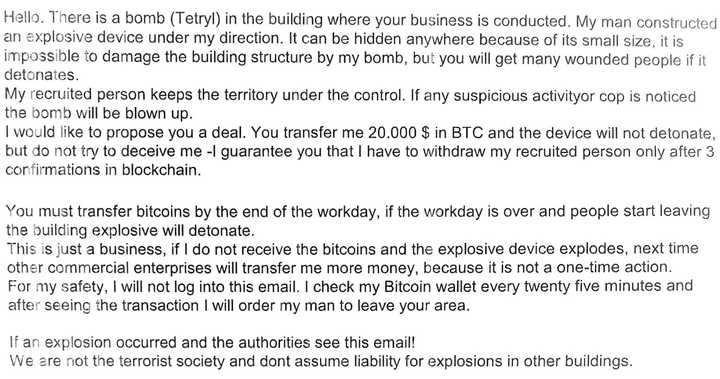Buildings were evacuated and searches were conducted at hundreds of locations from coast to coast before local and federal authorities deemed the threats bogus.
Although they weren't all identical, many of the emails appeared to come from Moscow and bore similar warnings and phrases, authorities said. Each demanded $20,000 it bitcoins to thwart the purported attack.
"There is a bomb (Tetryl) in the building where your business is conducted," says one of the threats, which were sent to various targets throughout North Jersey -- including schools, businesses and public businesses in Fair Lawn, Maywood, Ramsey, Wyckoff, Butler and nationwide.
"My man constructed an explosive device under my direction," the sender wrote. "It can be hidden anywhere because of its small size."
Used mostly during World Wars I and II to detonate dynamite, tetryl is no longer manufactured or used in the United States. Any of it that the Department of Defense finds at military installations it destroys.
"My recruited person keeps the territory under the control," one of the email threats says. "If any suspicious activity or cop is noticed the bomb will be blown up."
The sender demanded $20,000 in bitcoins to stop the purported device from detonating -- promising to "check my Bitcoin wallet every twenty[-]five minutes... [A]fter the transaction I will order my man to leave your area."
"Do not try to deceive me," the email says. "You must transfer bitcoins by the end of the workday. "If the workday is over and people start leaving the building[,] explosive will detonate.
"This is just a business. If I do not receive the bitcoins and the explosive device explodes, next time other commercial enterprises will transfer me more money, because it is not a one-time action.
"We are not the terrorist society and don[']t assume liability for explosions in other buildings," the email adds.
The threats are similar to the “sextortion” emails that "claim to have indecent images/videos of you that the attacker threatens to send to your contact list," cybersecurity company AppRiver said. "We have been seeing these type of emails being pumped out daily by the millions.
"[This] attack does not appear to have the bandwidth of the sextortion messages, which leads us to believe it may be a copycat of sorts," AppRiver added.
According to AppRiver: "The messages appear to be emanating from Moscow and the poor wording does fit with someone that is not a native English speaker, although these could always be false flags....[W]e can say with a high degree of certainty that these are based in fiction and are merely a desperate money grab."
The FBI remained in contact with the various law enforcement agencies involved.
"As always, we encourage the public to remain vigilant and to promptly report suspicious activities which could represent a threat to public safety," the bureau said.
Click here to follow Daily Voice Northern Valley and receive free news updates.
